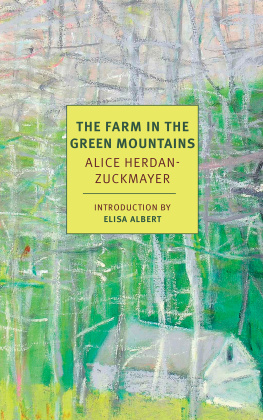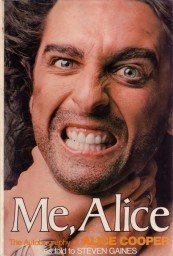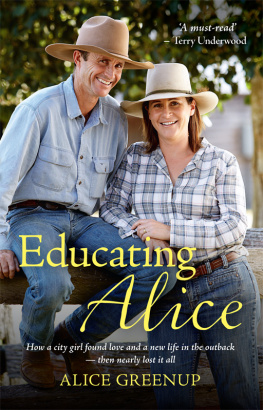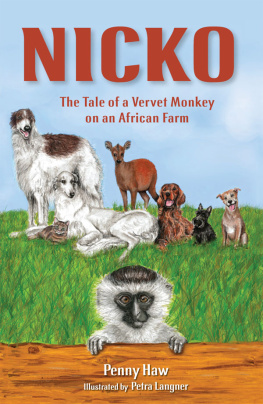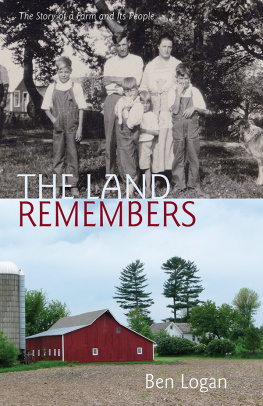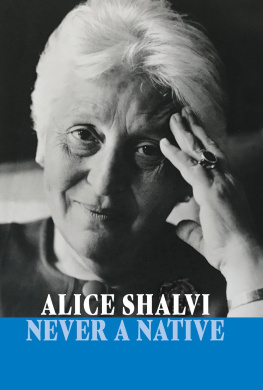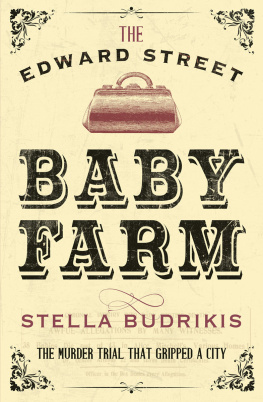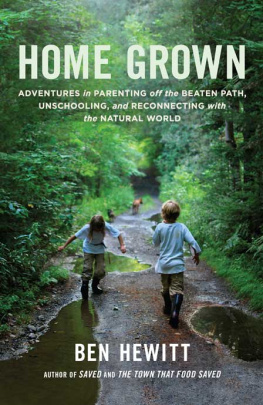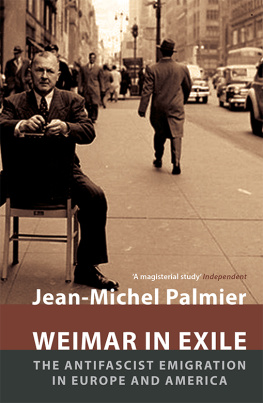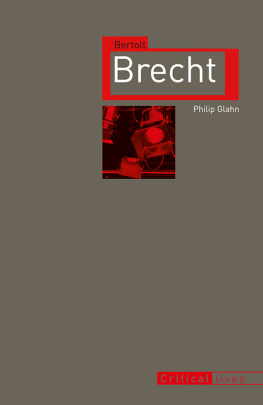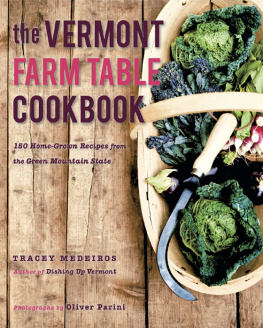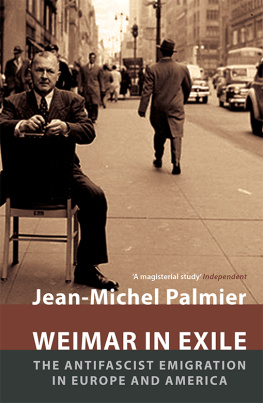
ALICE HERDAN-ZUCKMAYER (19011991) was born Alice Henriette Alberta Herdan-Harris von Valbonne und Belmont in Vienna shortly after her parents divorce. As a girl, she was a pupil of the radical education reformist Eugenie Schwarzwald and Alice met her first husband, the psychologist and future anti-Nazi leader Karl Frank, through Schwarzwald. Her marriage to Frank was short lived and Alice, now living in Berlin with their daughter Michaela, supported herself by acting and with secretarial work, though she hoped to become a doctor. She met the writer Carl Zuckmayer at a party of actors and artists, and the two married in 1925, the same year Zuckmayer was awarded the Kleist Prize for his play The Merry Vineyard. The next year she gave birth to a second daughter, Maria Winnetou. By 1933 Zuckmayers works had been banned and the family moved, first to Austria, and then, in 1938, to Switzerland. They emigrated to the United States with the help of the journalist Dorothy Thompson in 1939. After the success of The Farm in the Green Mountains, Herdan-Zuckmayer published two more memoirs, Das Kstchen (The Box), about her childhood, and Das Scheusal (The Monster), about a dog.
ELISA ALBERT is the author of the novels After Birth and The Book of Dahlia; a short-story collection, How This Night is Different; and the editor of the anthology Freuds Blind Spot. Her fiction and nonfiction have appeared in various publications, including The New York Times, Tin House, The Guardian, and on NPR.
IDA H. WASHINGTON taught German literature for many years and, along with her husband, Larry Washington, helped found the German-language program at the University of Massachusetts at Dartmouth. She is the author of Dorothy Canfield Fisher: A Biography and collaborated with her daughter CAROL E . WASHINGTON on the translation of The Farm in the Green Mountains.
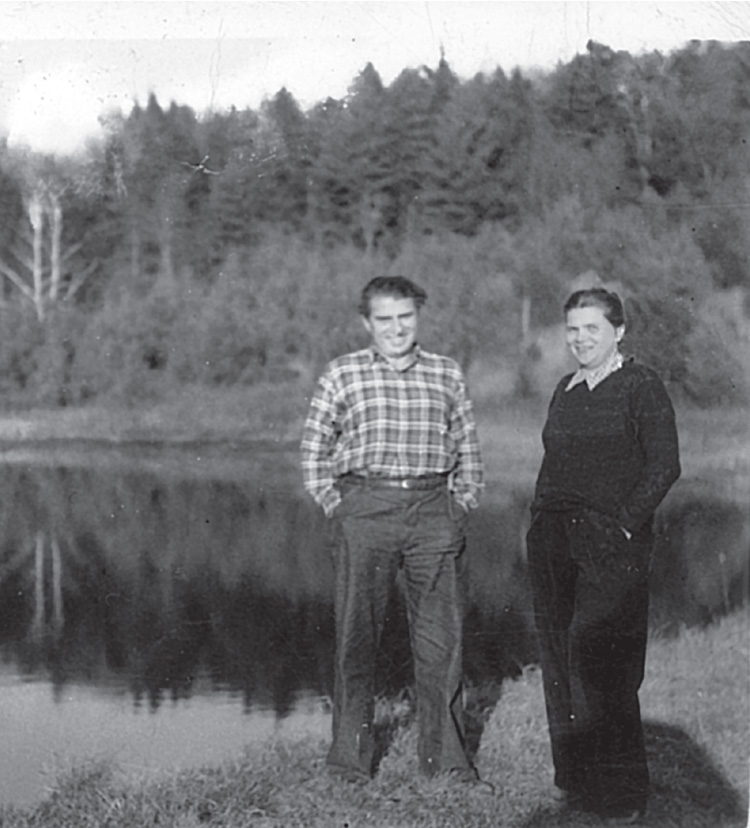
Carl Zuckmayer and Alice Herdan-Zuckmayer at the pond at Backwoods Farm, 1941.
THE FARM IN THE GREEN MOUNTAINS
ALICE HERDAN-ZUCKMAYER
Translated from the German by
IDA H. WASHINGTON and
CAROL E. WASHINGTON
Introduction by
ELISA ALBERT
NEW YORK REVIEW BOOKS

New York
THIS IS A NEW YORK REVIEW BOOK
PUBLISHED BY THE NEW YORK REVIEW OF BOOKS
435 Hudson Street, New York, NY 10014
www.nyrb.com
Copyright 1968 by Alice Herdan-Zuckmayer
Translation copyright 1987 by Ida H. Washington and Carol E. Washington
All rights reserved.
Cover art: Wolf Kahn, Dark on the Right, 2009; Wolf Kahn / Licensed by VAGA, New York, NY
Cover design: Katy Homans
First published as Die Farm in den Grnen Bergen in 1949. Published here by arrangement with S. Fischer Verlag GmbH, Frankfurt am Main.
All photographs Archiv S. Fischer Verlag
Library of Congress Cataloging-in-Publication Data
Names: Herdan-Zuckmayer, Alice.
Title: The farm in the green mountains / Alice Herdan-Zuckmayer ; introduction by Elisa Albert ; translated by Ida H. Washington and Carol E. Washington.
Other titles: Farm in den grnen Bergen. English.
Description: New York : New York Review of Books, 2017. | Series: NYRB classics | Translation of: Die Farm in den Grnen Bergen.
Identifiers: LCCN 2016058214| ISBN 9781681370743 (paperback) | ISBN 9781681370750 (epub)
Subjects: LCSH: Herdan-Zuckmayer, AliceExileVermont. | Authors, Austrian20th centuryBiography. | Zuckmayer, Carl, 18961977Exile Vermont. | Authors, German20th centuryBiography. | Vermont Description and travel. | BISAC: BIOGRAPHY & AUTOBIOGRAPHY / Personal Memoirs. | BIOGRAPHY & AUTOBIOGRAPHY / Women. | BIOGRAPHY & AUTOBIOGRAPHY / General.
Classification: LCC PT2617.E653 Z46313 2017 | DDC 838/.91409 [B]dc23
LC record available at https://lccn.loc.gov/2016058214
ISBN 978-1-68137-075-0
v1.0
For a complete list of titles, visit www.nyrb.com or write to:
Catalog Requests, NYRB, 435 Hudson Street, New York, NY 10014
CONTENTS
INTRODUCTION
W hen i first read this wise refuge of a book, a blustering butthead had just been elected president of the United States, and everyone was freaking out. Via any number of platforms on any number of screens, there was a cacophony of anxiety and grandstanding and myopia and rage and despair such as I have never seen, or maybe the sheer number of platforms and screens were the never-before-seen entity. Regardless, things seemed to be turning faster and faster in some widening gyre. So it came to pass that I found great comfort in the voice of Auntie Al, as I came to think of the indomitable Alice Herdan-Zuckmayer (I cant imagine shed mind). It was, in other words, just the right book at just the right time.
Exiled from Germany at the start of World War II when the murderous fascist dictator of the hour didnt take kindly to her famous playwright husbands satirical critiques, and left cold by stints in New York (We saw everything, we went everywhere, but never found ourselves) and Los Angeles (Zuck didnt want to write tripe for the movies), Alice and Zuck found their way to the titular 193-acre farm in the Green Mountains of Vermont.
These were urbane sophisticates, mind you. These were celebrated artistic intellectuals with connections, good clothes. Alice had been an actor and then hoped to become a doctor. She had begun medical school. Her birth name was Alice Henriette Alberta Herdan-Harris von Valbonne und Belmont, for goodness sake. These were not people who knew from farming. They had no clue if or when they might ever return home. The very idea of home had become impossibly muddled, if not permanently eradicated. They were emigrants. They were immigrants. They had no choice. They had to find themselves a new home, and they had to get to work. They chose the farm in Vermont. They got to work.
It was the usual course, Alice says, one had no right to be an exception.
She refuses to be exceptional; this is one of the things that makes her exceptional. Theres no grandstanding here, no hand-wringing, no self-pity. The nineteen vignettes that became Die Farm in den Grnen Bergen started out as letters to her in-laws. Updates, explanations, thats all. Practical, sensible, and without illusion. How refreshing. Erich Kstner (the author of The Parent Trap, among other books, and a writer with the distinction of having watched while his own books were burned by the Nazis) published some of these dispatches in the postwar Munich newspaper he edited, and the rest is history.
The Zuckmayers learn by necessity. They learn by doing. They acquire domestic animals (cats, dogs) and farm animals (chickens, geese, ducks, pigs, goats). They figure out animal feed and disease and shelter and care. They chop wood, they tend fire. They navigate dense woods and icy, snowy, muddy dirt roads. They obey the rules set forth by the seasons, the weather, the landscape, the rural community, the animals, and the land itself. They plant crops for sale and vegetables for their own sustenance. They harvest and slaughter and cook and clean. They bake and sew. They fight a harrowing infestation of rats. They take instruction from USDA pamphlets and from friendly neighbors. There is a hilariously cranky, bossy old woman on their party line. There is a transgender house cat, an infertile chicken, an antisocial duck, and a naughty dog. There are misadventures and horror stories and always, always there is more work to be done. The intricacies of their days, the ins and outs of life on the farm as it is learned and lived by these unlikely inhabitants, this is superficially what

